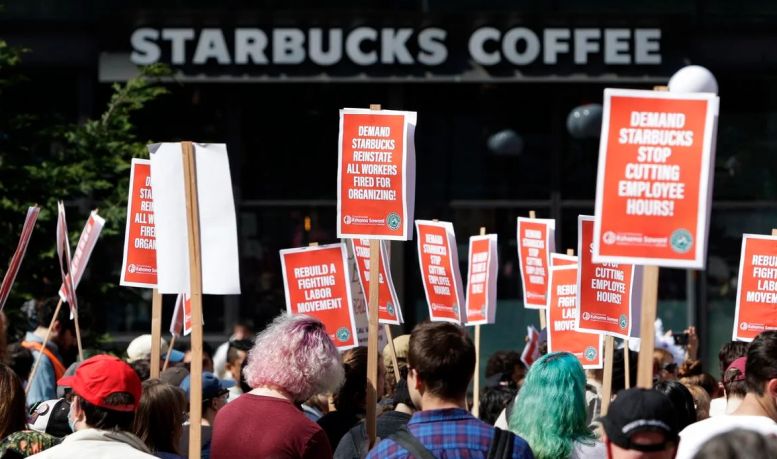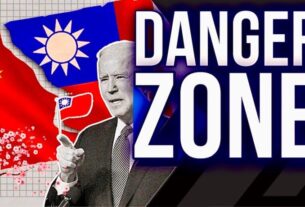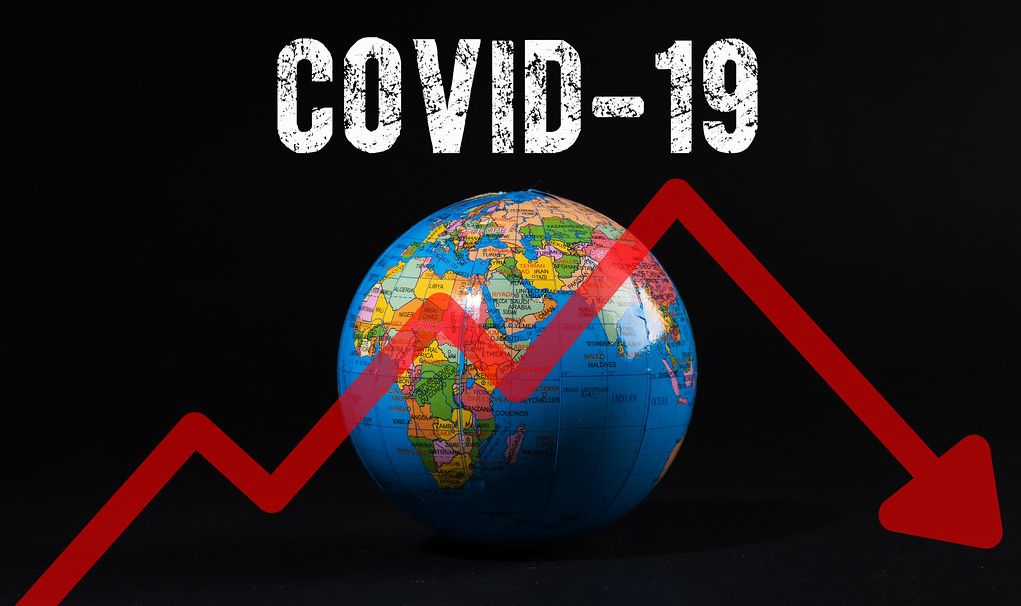International Pressure Helped Bring Them to the Table
In a dramatic breakthrough on February 27, the multi-billion dollar Starbucks corporation agreed to national negotiations with its employees’ union Starbucks Workers United after more than two years of stalling. Union sources have reported that bargaining will start on April 24, probably in Chicago.
National negotiations, as opposed to previous attempts to negotiate mini-contracts on a store by store basis, will make an enormous difference, empowering workers to shut down all 394 union-represented stores in coordinated strike action if Starbucks keeps stalling at the bargaining table.
The union is calling for a base pay of $20 an hour for baristas and $25.40 an hour for shift supervisors, with significantly higher rates for workers in areas where the cost of living is high. They are also demanding stronger language on scheduling, healthcare, and many other issues.
The company has also agreed to end some of its most brutal union busting tactics, like its illegal withholding of raises and credit-card tipping from stores that voted for the union prior to August of 2022, with credit card tipping being provided by April 15. Starbucks also says it will pay back pay to cover workers’ losses, which will mean substantial payments for affected employees, though these illegal union tactics already drove many pro-union workers out. Starbucks has not agreed to end some of its most vicious union-busting tactics, like fear-mongering about healthcare benefits to trans workers.
The only reason Starbucks billionaire executives have signaled they are willing to talk is because the union drive has started to impact their massive profits, and in a way that owes much of its punch to working class protests against the Israeli state’s assault on Gaza. In a powerful lesson about international solidarity, the union’s willingness to confront Starbuck’s apologetic statements about the Israeli regime’s genocidal war in Gaza has almost destroyed Starbucks operations in the Middle East.
The biggest danger now would be if the union lets up the pressure in a misguided effort to appear “reasonable” at the bargaining table. This was attempted during the earlier stages of the campaign, when union strategists instructed newly organizing stores to write apologetic letters to Starbucks’ CEO, appropriating the company’s language of “partnership” to “explain our reasons for unionizing and our sincere desire to make Starbucks a better company.” This created unrealistic expectations of an easy path to unionization, which were dashed when Starbucks, predictably, turned to union-busting, illegal retaliation, and threatening jobs.
Knowing this, while preparing to bargain, the union also needs to prepare to strike. Each store should elect a strike captain to link up with others and prepare co-workers to up the pressure and hit Starbucks where it hurts. A nation-wide, one day strike linked to community pickets at the non-union stores to gum up drive-through lanes would be a big step forward towards forcing Starbucks to sign a good contract. It’d be important that this is done in coordination with the workers inside those non-union stores.
A union win at Starbucks, and more importantly a strong contract, would be a victory for workers everywhere. It could jumpstart the wave of union drives in the retail and service sectors, where tens of millions of low-wage workers are looking to fight back against the billionaire class.
How To Fight a Bully
Since the first store won a union election in Buffalo, NY in December 2021, the company has refused to bargain and has fired and harassed union activists all over the country. After a flood of early filings following the December 2021 victory, filings began to drop off a few months afterwards as it became clear that the company was playing hardball and that the union leadership were not taking a fighting stance.
Most Starbucks workers correctly recognized they were indeed in a fight. They organized walkouts over safety issues and retaliation at some stores. In addition, there were citywide and eventually nationwide days of strike action. These were an important step in the right direction because they disrupted Starbucks ability to make profits. However, because SBWU leaders were hesitant about setting up clear, national democratic structures for rank-and-file workers to play a direct role, an unfortunate feature of some of these strikes was low turnout of workers, unenergetic picket lines, etc. For effective strikes, it will be necessary for SBWU to set up real, democratic strike committees in every store.
Starbucks has continued the attacks. At about 25 stores, individual employees backed by the right wing National Right to Work Foundation have since filed for decertification elections which if upheld, could overturn the results of the union election and remove that store from the union contract. These decertification requests, which cannot be filed until at least a year after the original election, have so far been denied by the NLRB because of outstanding ULP charges against the employer. A multibillion-dollar corporation like Starbucks knows time is on their side in a fight against low-wage workers who are often saddled with high rents, student debt, and inflation. This is why it’s important to escalate now.
Socialist Alternative Members Fought for More Aggressive Tactics
Throughout 2022 and into 2023 Socialist Alternative members working at Starbucks argued for an aggressive, class conscious campaign based on clear demands. Although the union strongly rejected these ideas at the time, some of these tactics – including clearly spelled out demands – have since been adopted and although at a slower pace, new filings and election wins continued to accumulate as workers asserted themselves by demanding more militant actions. These included one day strikes, Red Cup Days, and other public actions. Despite impressionistic images in the media of an overwhelmingly young workforce working as baristas to pay their way through college, the steady progress in store filings and the push for stronger actions mostly came from veteran workers who have stayed the course because they want to make this their long term careers.
International Solidarity Was Essential to Force Starbucks To The Table
Starbucks has lost $11 billion in its stock value since its November 16 Red Cup Day promotion. This is clearly linked to the union’s actions (200 stores struck on last year’s Red Cup Day versus half that number in 2022) but it seems that the trigger for the company’s about-face was the global boycotts sparked by its aggressive efforts to silence the union’s public statements about Gaza. When the Israeli bombardment of Gaza began, union activists running the union’s Twitter account posted statements of solidarity with the Palestinian people. The company sued to stop the union, Starbucks Workers United, from using its name and the union’s spoofed version of its logo. In the context of worldwide protests against the Israeli assault, word spread internationally that Starbucks was supporting the bombing.
In the US itself, student groups at 25 college campuses are organizing to drive SBX off campus because of its defense of Israel’s policies. McDonald’s and other corporations have seen similar actions. This also led to widespread picketing and boycotts of Starbucks stores in the Muslim world, including Malaysia, Morocco and across the Middle East with 2,000 workers being laid off by a Kuwait-based subsidiary with some governments, such as Erdogan’s in Turkey, seeing an opportunity to distract attention from their own crises by supporting these boycotts and protests, much as the ANC government in South Africa has responded to pressure from below by filing charges at the International Court of Justice against the bombing – despitelong term ties to Israel. Sales also fell in China.
As this article is being written, Starbucks’ attempts to distance itself from the Israeli government are being seen as far too little and far too late, although the union negotiations are seen as relevant. In their statement about negotiations, Starbucks corporate clearly referenced the union’s solidarity efforts, and subsequent global pickets and boycotts, as a key factor in their thinking. Even the pro-capitalist Financial Times acknowledged that Starbucks’ lawsuit against the union “left Starbucks in the crosshairs of both pro-Palestine and pro-Israel protests.” The whole experience shows how unions do not gain anything from remaining silent on global affairs. It also shows how workers in an imperialist country like the United States can link up solidarity and common struggle with working people around the world.
Workers Continued to Organize Despite Company Stalling
By December the company was in discussions with the union leadership about the Gaza lawsuit. In the meantime, workers continued to organize with 21 stores declaring on the eve of the February 27 announcement. None of this would have happened without the tenacity of the thousands of unionized workers who have refused to give up in the face of Starbucks’ unrelenting legal and illegal attacks. More workers have continued to unionize despite the failure of the NLRB and the courts to stop the company from continuing with hundreds of labor law violations, and the union leadership’s refusal to implement longer and more effective strikes.
SBWU leadership, instead of keeping union members up to date with these developments, left it up to the company to announce its offer to bargain in a message from “Chief Partner Officer” Sarah Kelly to all employees on February 27. The union has said that each unionized store will elect one representative to the national bargaining team. It has also said that only 150 of these, chosen by lottery, will be able to attend negotiations in person but that the remainder (about 250 workers) will be able to view the union’s caucuses in between bargaining sessions on Zoom. There is no reason to cap Zoom attendance. The union needs to do more to engage workers in the bargaining process. This can be done by organizing discussions in every store to update workers on negotiations which can also serve as the launch point for escalation and strike action in the likely event Starbucks keeps stalling.
National Bargaining Could Be A Game-Changing Breakthrough
An agreement that the union and the company will bargain one national contract is a very real breakthrough. The store-by-store organizing campaign, which was allowed by the NLRB in 2021, has always carried with it the problem that the company could hold things up by demanding store by store bargaining. Earlier in the campaign this idea was embraced by the union as a sign of its horizontal democracy, with every worker from every store being encouraged to participate but it was clearly unworkable because this massive, multibillion-dollar multi-national company could not be allowed to whipsaw any of its hundreds of stores against each other.
Meanwhile, Starbucks has joined a lawsuit filed by Amazon, Trader Joe’s, and Elon Musk’s SpaceX company to have the entire National Labor Relations Act declared unconstitutional, which if the Supreme Court so decides would potentially mean that all of the roughly 400 elections won by Workers United, along with all of its Unfair Labor Practice charges, would become meaningless. This is not the likeliest perspective but it’s clearly a pressure tactic against the union. SBWU should demand Starbucks backs out of the lawsuit before sitting across the table from them – how can Starbucks negotiate in good faith while campaigning to undermine collective bargaining everywhere?
It is troubling that the union has already told activists to pause escalating actions while the company is doing the opposite. The dangers of letting up the pressure now have mostly been ignored by commentators on the Left. Leading DSA activist Eric Blanc mentions the lawsuit in an optimistic recent article in Jacobin without mentioning that Starbucks has joined it. The highly regarded website Labor Notes, in an otherwise thorough report on what it correctly calls a breakthrough, doesn’t mention either the Supreme Court case or the international boycott of Starbucks and other US corporations due to their support for Israel. The problem with not mentioning the Supreme Court threat is that it can leave Starbucks workers unprepared for the difficult tasks of actually winning a strong contract against an employer that is still playing hardball, despite its claims to the contrary.
The problem with not mentioning the question of solidarity with Gaza is that it implies that the union’s political positions don’t matter. There should be no retreat from SBWU’s stance of international solidarity against the war on Gaza. The fact that this was a catalyst for the company’s decision to commence bargaining – which it should have done two years ago – does not make it a bargaining chip, and under no circumstances should the union, or its parent union SEIU, agree to any joint statement with the company in order to make the company’s international problems go away. It would be wrong for any US labor union to try to trade economic gains for US-based workers against workers’ lives elsewhere in the world, and the union needs to make clear that this is off the table. The union should also reach out to other unions that represent or are in the process of organizing Starbucks workers around the world.
Celebrations Are Premature
As veteran union organizer Jonathan Rosenblum has pointed out, the connection between workers’ struggles in the US, events in the former colonial world, and America’s weakened ability to control them have clearly played a very significant role in precipitating the company’s new attitude to the union.
Billionaires and corporations can afford to wait out union activists, they can pay their lawyers to attend every court hearing and fight every charge. Working people don’t have that luxury; the rent won’t wait, and reports from activists indicate that many mainly younger workers who were involved in the early stages of the campaign have since moved on.
Unfortunately, the union leadership’s overly conciliatory language in their press releases, and its standing back to let the company be the first to make the announcement, point in the opposite direction. At a mass Zoom meeting of 300 union activists a few days after the announcement, workers were told that the union has called a temporary pause on escalating actions including strikes. This is a mistake. The only thing a bully like Starbucks understands is power, and the most powerful weapon workers have is to shut down the source of profits by going on strike.
Urgent Need for A Reset, More Concrete Demands, Escalate Strategy To Win
The company will ferociously oppose any union contract that sets pay standards, benefits, and working conditions that are clearly better than at the non-union stores, which are the vast majority. They will want to limit and contain the union’s growth at all costs. Therefore, the union should go into bargaining with a set date to call for a national strike of its almost 400 unionized stores if its demands are not met. Instead of holding off on public actions as indicated in its public statements and last week’s meeting with rank and file activists, the union should reignite the organizing drive, highlighting its concrete demands with mass canvassing and public rallies to bring in more unorganized workers and stores As long as Starbucks can pit union versus non-union stores, Starbucks workers as a whole will pay the price.
The company and the union have indicated that they plan to resolve all outstanding Unfair Labor Practice charges or ULP’s prior to bargaining, but it would be a mistake for the union to agree to this. Outstanding ULP’s can be used to support strike action, because in a ULP strike it’s illegal for the company to fire or replace striking employees. This legal weapon should be held in reserve until a contract is reached.
The company has also said it will adopt a less aggressive posture in stores that have not yet filed or voted but has stopped short of a promise of neutrality. The union should demand an end to captive audience meetings and that Starbucks remove itself from the pro-corporate lawsuits against the NLRB, which are an attack on all workers.
The stakes are high. Winning a strong contract at Starbucks would be a huge boost to tens of millions of non-union workers in the retail and service sector. The best tool for organizing the unorganized, and rebuilding a fighting labor movement, is to win concrete victories against billionaire bosses, and this means focusing everything on winning a strong contract. This won’t be done through friendly chats at the negotiating table with Starbucks’ team of union-busting lawyers and HR consultants. Winning a strong contract means relying on the collective power of Starbucks workers and ramping up the shop-floor organizing that won union elections at hundreds of stores in the first place, and forced a vicious union-busting corporation like Starbucks to even sit at the negotiating table.
It’s good that the union has published its demands so that every worker can see what’s being fought for. But after two years of stalling, the demands themselves should be re-discussed by the membership. They should include high-quality, zero-premium healthcare, strong pensions, adequate paid time off, and more to make working at Starbucks a good, stable job.
On pay, a national contract should set a national wage demand rather than the present stance of asking for “at least” $20, which members have been told would be higher in “high” cost of living areas. This opens up the dangerous prospect of whipsawing different regions against each other. After all, the price of a latte doesn’t change significantly from region to region, but Starbucks makes huge profits exploiting workers in impoverished regions with a “lower cost of living.” Any wage figure that is agreed upon needs to come with language guaranteeing Cost of Living Allowances (known as COLA’s) to make sure wage gains are not eaten up by inflation.



